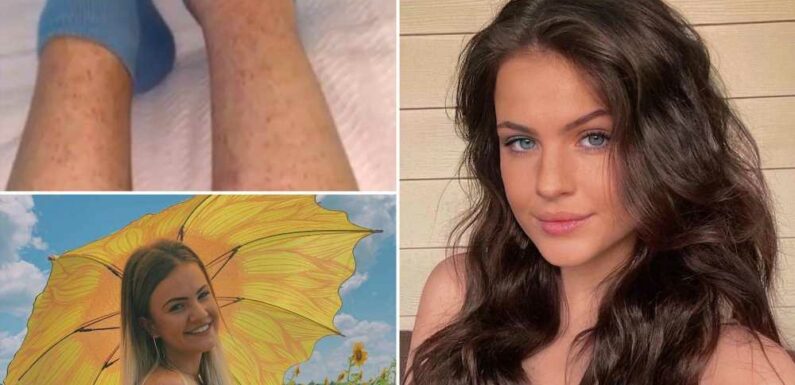
A WOMAN nearly died after what she thought was a harmless rash was actually a sign of a rare killer disorder.
Juliana Pascarella, 21, from Virginia, US had her whole life changed in a matter of hours when, in April 2020, she noticed little red dots all over her body.
She initially dismissed the rash but, within just 15 minutes, she deteriorated dramatically.
"I was nauseous and dizzy, and turned extremely pale and green,” the student explained.
She also developed bruises all over her body.
Juliana was rushed to hospital and hours later, was diagnosed with idiopathic thrombocytopenic purpura (ITP) – a rare blood disorder.
read more on rashes
How to spot monkeypox rashes on different skin tones revealed
Can you spot the dangerous rashes from the harmless ones?
Doctors told her she was minutes away from death and an emergency platelet transfusion is all that could save her.
In Juliana’s case, her diagnoses had dire consequences.
She was told that her brain could haemorrhage at any point in her life – which she may not survive.
A brain haemorrhage is a type of stroke which causes bleeding in the surrounding tissues and kills brain cells
Most read in Health
Urgent drug alert issued over contaminated antibiotics – check yours now
The 6 worst Covid hotspots revealed as viral clusters emerge – are you at risk?
Warning to parents after surge in flu cases strikes – with kids under 5 at risk
Here are 6 physical symptoms of anxiety you must never ignore
"Knowing that my brain could haemorrhage at any second and I could lose my life really showed me a new perspective on life,” the young woman explained.
ITP is a rare blood disorder that affects 200,000, commonly aged over 60.
The disease causes bleeding under the skin because of low platelets (cells that form clots which in hand stop bruising).
Due to the small amount of platelets, bruises start to appear.
After arriving at the hospital, doctors discovered that the platelets in Juliana's body were extremely low.
This meant she needed to have a blood transfusion straight away – without it, her brain could have haemorrhaged.
She said: "The nights of IVIG transfusion treatments were the worst, it is a therapy treatment for patients with antibody deficiencies, but I knew it was the only thing that was helping me.
"Having someone else’s plasma enter into my body over three separate seven-hour periods was a lot to take in."
Juliana now lives in "constant fear" of another episode.
"It’s very confusing and a back-and-forth fear, wondering when or if it will spontaneously happen to me again," she explained.
Since her diagnosis, the young woman says her perspective on life has changed completely.
She said: "Being a young female entering her 20’s, I realised that life is not guaranteed and I have to make the most of what the universe has provided me.
"I must take care of my body and look out for myself, as well as others.
"This experience was life changing, and although it was one of the worst, I'm glad to have a set diagnosis.
"I can be prepared for future episodes and help others understand a condition I once knew nothing about," she said.
She now wants to encourage more people to start speaking up about their health if they think something is wrong, rather than just pushing it aside.
Juliana shared her experience with ITP in a video posted on TikTok -which now has more than 2million views and 200,000 likes.
"You should always be aware of your own body," she explained.
"Our brains tell our body when something is wrong, and if we don’t pay attention or brush it off like it is nothing, it can be life threatening," she said.
Read More on The Sun
Free cash you can get on Universal Credit this Xmas you DON’T have to pay back
My 20min drive takes 2 HOURS due to roadworks for a bike lane no one will use
"Always look for fast-appearing marks and bruises, and pay attention to the way you feel physically.
"If you have an idea that something may be off, find a medical professional, ask questions, do your research, and most importantly, take care of yourself and get the treatment you need before it’s too late," she added.
Source: Read Full Article











